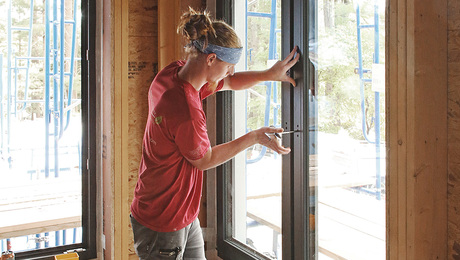ICF construction and fresh air sources
What are some good but economical ways of providing fresh air in a tight ICF (insulated concrete form) constructed house?
What are some good but economical ways of providing fresh air in a tight ICF (insulated concrete form) constructed house?

This time-tested installation method for flangeless windows ensures smooth operation and provides air, water, and vapor control.

"I have learned so much thanks to the searchable articles on the FHB website. I can confidently say that I expect to be a life-long subscriber." - M.K.
Get home building tips, offers, and expert advice in your inbox
Fine Homebuilding
Get home building tips, offers, and expert advice in your inbox
© 2024 Active Interest Media. All rights reserved.
Fine Homebuilding receives a commission for items purchased through links on this site, including Amazon Associates and other affiliate advertising programs.
Get home building tips, offers, and expert advice in your inbox
Become a member and get instant access to thousands of videos, how-tos, tool reviews, and design features.
Start Your Free TrialGet complete site access to expert advice, how-to videos, Code Check, and more, plus the print magazine.
Already a member? Log in
Replies
A window...
Life is not a journey to the grave with the intention of arriving safely in a pretty and well preserved body, but rather to skid in broadside, thoroughly used up, totally worn out, and loudly proclaiming
WOW!!! What a Ride!
A window...
Sheesh.
If you're going to be on a roll, why not make it a Kaiser . . . ?
Poor new guy doesn't know any better yet.
They hired a bricker to cover up his ICF house that had an equally-skilled HVAC installation. He was probably standing outside trying to get fresh air in the house when he noticed a complete lack of weep holes in the brick work. Wait till he finds out the bay window leaks . . . Occupational hazard of my occupation not being around (sorry Bubba)
And undersized ducting with a speeded up blower to compensate...
What about his flashing issue???
Life is not a journey to the grave with the intention of arriving safely in a pretty and well preserved body, but rather to skid in broadside, thoroughly used up, totally worn out, and loudly proclaiming
WOW!!! What a Ride!
I got no idea if he's flashing, after all, he's new . . .
Maybe he needs blinds or curtains.
For his brick flashing, he's likely up the same creek as Sasha . . . Occupational hazard of my occupation not being around (sorry Bubba)
HRV= Heat Recovery Ventilator.
You can also run your exhaust fans through them to recover heat b/f the air is exhausted outside. Basically a small air to air heat exchanger the exhaust stale air from the house, but recovers the heat from it to condition an equal amount of fresh air that it is pulling into the house.
Dave
Examples for him:
http://www.renewaire.com/aboutus.htm
http://www.kooltronic.com/thermax/catalog/catalog.htm
I've heard that you could run bathroom/kitchen exhaust fans through a ERV/HRV. How do they keep from getting gunked up from the kitchen exhaust? Is there a cleanout or some such? I've seen some pretty nasty kitchen exhaust ducts.jt8
Good question.
To be honest I haven't seen one in operation long enough to overload the filters at the hoods. I have replaced flex duct with metal duct on one system. It was one of those downdraft models, and poorly maintained by the HO.
Others may have more experience and information than I.
Dave
In the absense of someone with info on the kitchen hookup, I did have a thought (happens once in a blue moon, but my brain hurts now).
What if you actually had a heat exchanger local to the kitchen exhast? In which case the gunky air doesn't go back to the main ERV, it passes through a local heat exchanger and then exits.
Although I think you'd still be asking for trouble. You make grease-ladden air go through a maze and you're gonna have more build-up.jt8
Run a greasy kitchen exhaust through a typical ERV? I'd be surprised to see that recommended.
I can understand from an energy efficiency point of view where they're coming from. The kitchen exhaust can be pumping out 150cfm, and that is a lot of air that you're not recovering energy from.
But they certainly have some issues to deal with. Even if you had an extra cleanout, you would have to take into account that a lazy ho might not clean it out...which would eventually everwhelm the extra cleanout and work its way towards the ERV (and leave you with a lot of nasty ductwork). And at some point, wouldn't it become a fire hazard?
jt8
Run a greasy kitchen exhaust through a typical ERV? I'd be surprised to see that recommended.
Not only that, but our inspector required separate kitchen and dryer penetrations for venting. After he was gone I rerouted the ductwork. Knowing how we live and cook it isn't a problem, 10 yrs later. I did put a commercial filter in the hood ductwork.
When this becomes a rental I'll go back to the original ducting. Somebody else could easily put a lot more grease in the system.PAHS Designer/Builder- Bury it!
your house will not be that tight